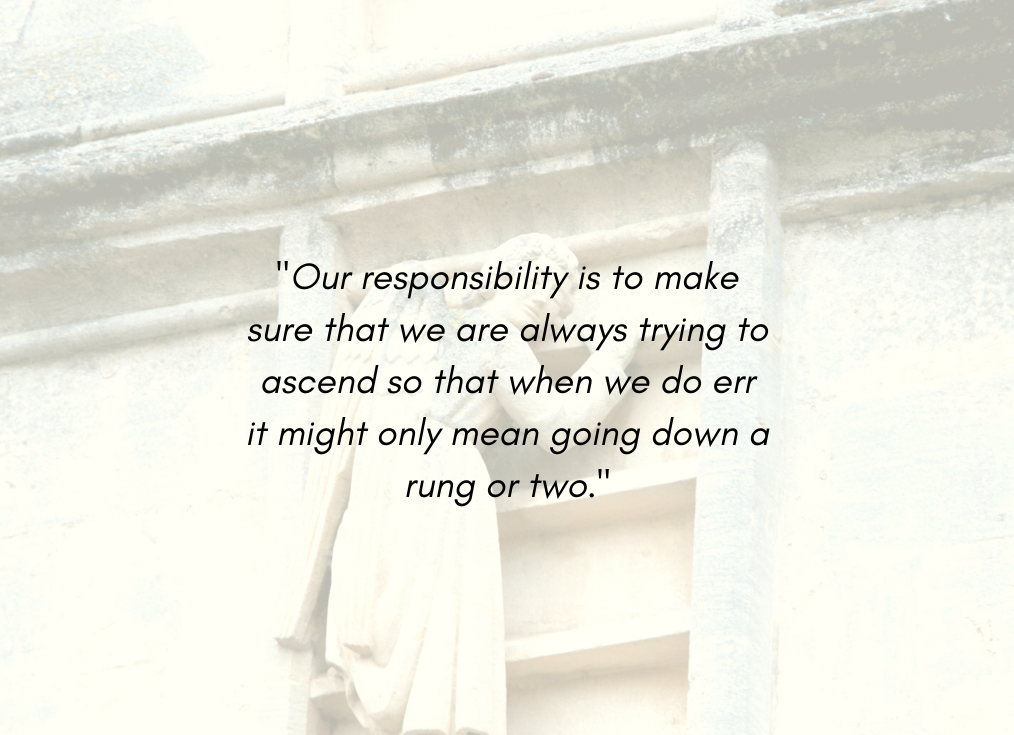Jacob’s Ladder

November 12, 2021
This week’s Torah portion, Vayetze, contains the gamut of familial emotions; love, jealousy, trust, anger, fear, joy, fertility, childlessness, and so much more. In fact, it is in this week’s parshah that we are provided the answer to why we only have three patriarchs (Abraham, Isaac, & Jacob) as opposed to four matriarchs (Sarah, Rebekah, Leah, & Rachel). But alas, you will have to read the full parshah to get the answer to that quandary because the part of the text that I want to draw our attention to this week is the story of Jacob’s ladder. Yes, many are familiar with the reference, some might even know the highlights behind the story, but how many have stopped to think about the lessons to be learned from this incredible dream?
“And [Jacob] dreamed, and behold a ladder set upon the earth and its top reached to heaven; and behold, angels of Gd were ascending and descending upon it.” (Genesis 28:12)
The imagery of this verse is beautiful. Many an artist, and great sage, has tried to capture Jacob’s innocence and vulnerability while asleep, while also portraying the glory and sanctity of Gd’s angels transitioning from earth to heaven and in return. The rabbis understood the symbolism to epitomize Jacob’s holy demeanor and highlight his ability to connect our physical world with Gd’s heavenly realm.
Alas, when I was a skeptical teen, I saw this dream oh so very different. I remember peppering my rabbi with questions like: “Why a ladder, didn’t they have stairs back then?” How about, “How wide was this ladder that angels could go up and down at the same time?” Or, maybe my most insolent question, “What do angels need a ladder for, don’t they have wings, and can’t they just fly everywhere?” I am sure it was because of questions like this that Gd guided me into the field of education, and specifically to teach middle schoolers for most of my career.
And yet, years later those same questions still remain. Maybe I am not as acerbic, but I still wonder about those angels every time I am reminded of this story. Thankfully, I have come to an understanding, possibly even an appreciation, of Jacob’s dream as a metaphor for how we should live our daily lives.
The mobility of the ladder is exactly that, portable. Our relationship with Gd is mobile. It is not based on any one location. Who we are, how we behave, the choices we make, are all tied to our holiness, which travels with us wherever we go.
The ascending and descending angels represent our good and not-so-good deeds. Their ability to pass one another simultaneously shows how one good deed moving us closer to Gd can instantaneously be matched by a poor choice or errant decision that moves us further away. Even the very nature of the ladder requires us to consider our whole selves. We cannot ascend by only using our legs, we need our hands, our balance, our eyes. We need to be moving with our mind and bodies in unison. Any distractions could be fatal.
And why did Jacob dream of angels and not of mortal heroes and heroines? Because even angels are imperfect. The lesson to be learned is that we should not expect perfection of ourselves. We have flaws and we have limits, and we will have times when we descend the ladder. We cannot avoid it. Our responsibility is to make sure that we are always trying to ascend so that when we do err it might only mean going down a rung or two.
“So how does Jacob’s ladder relate to our community?”I hear you asking. You may be thinking, “This story is all about me, how I behave, the choices I make, the life I try to live.” And yes, you are correct, but Jacob’s dream came to him while on his journey to meet his community. To begin his life. To meet his brethren and establish his livelihood. Understanding ourselves is fundamental. But, understanding ourselves in order to build community is equally as critical. Humans were never intended to be in isolation, this is why the pandemic has been so difficult.
Last week I emphasized the importance of the concept that relationships matter. This week I encourage us all to ascend our ladders by reaching out to an elderly loved one, or neighbor, or simply say hi to someone shopping alone in the supermarket, because relationships matter, because we are…
Shabbat shalom,

